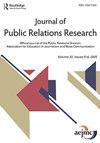Religion matters: explicating religion’s underexamined role in corporate social advocacy (CSA) conceptualization and research
IF 4.4
2区 文学
Q1 COMMUNICATION
引用次数: 6
Abstract
ABSTRACT Corporate social advocacy (CSA) is an emerging framework in public relations research that is receiving increased scholarly attention; however, we find that in light of the fact that CSA applies a narrow application of the term “corporate” and tends to focus on progressive/left-leaning issues and corporations at the expense of understanding potential similarities and differences of organizations managing contentious issues across the political spectrum, the current CSA framework needs further nuance to better capture publics’ or consumers’ motivations for proposed actions they take in response to CSA efforts. This essay addresses these limitations and advances the CSA framework by foregrounding religious conviction and the role it plays in CSA efforts. We argue that religion generally and religious conviction specifically in CSA warrant further study, as such investigations offer the potential for making CSA a more robust conceptual framework.宗教问题:解释宗教在企业社会倡导(CSA)概念化和研究中未经充分审查的作用
企业社会倡导(CSA)是公共关系研究中的一个新兴框架,正受到越来越多学者的关注。然而,我们发现,鉴于CSA对“公司”一词的狭义应用,并倾向于关注进步/左倾问题和公司,而忽略了理解跨政治范围管理有争议问题的组织的潜在异同,当前的CSA框架需要进一步的细微差别,以更好地捕捉公众或消费者为响应CSA努力而采取的拟议行动的动机。本文解决了这些局限性,并通过突出宗教信仰及其在CSA努力中的作用来推进CSA框架。我们认为,在CSA中,一般的宗教和宗教信仰值得进一步研究,因为这样的调查提供了使CSA成为一个更强大的概念框架的潜力。
本文章由计算机程序翻译,如有差异,请以英文原文为准。
求助全文
约1分钟内获得全文
求助全文

 求助内容:
求助内容: 应助结果提醒方式:
应助结果提醒方式:


